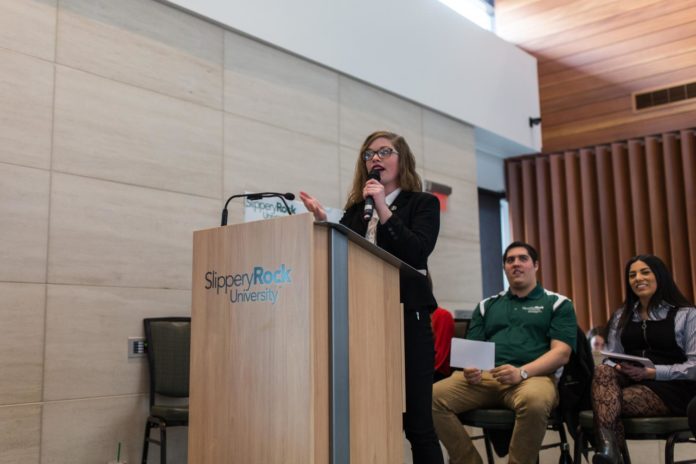
With the upcoming departure of four senior executive board members, the Slippery Rock Student Government Association (SGA) is shifting focus toward recruitment for the 2019-20 academic year in addition to long-term projects within SGA’s committees.
The focus on elections this year comes after last year’s elections failed to see more than one ticket. Five of the current executive board members, including current SGA President Dallas Kline, ran under the OneSRU ticket.
“I didn’t enjoy running against nobody last year,” Kline said. “Hopefully there will be at least two tickets.”
Since 2011, three election years (2011, 2015 and 2018) had only one ticket during campaign season. Last year saw the smallest voter turnout since 2011 with 534 votes, accounting for 8 percent of the full-time undergraduate student body.
Kline called last spring a quiet election cycle. After the senate appointed nine more senators last semester, nine senate positions—one graduate, three building and five commuter—remain open as of the beginning of this semester.
“We started last year with a lot of open positions,” Kline said. “That was a setback for us just because the election season last year was so quiet.”

Half of the executive board—including Kline, Elizabeth Hernandez (vice president of student and academic affairs), Logan Tupper (vice president of finance) and Kennedy Moore (vice president of diversity and inclusion)—and four commuter senators are seniors and will not return next year. A definite number of tickets and candidates will be confirmed after the deadline for petitions and election packets on March 22.
“It’s so exciting not knowing who’s going to be running,” Nicole Dunlop, vice president of internal affairs, added.
According to Kline, the election is being advertised through faculty, student media organizations, tabling, social media and on-campus meetings. SGA will also hold an information session on Feb. 19 during common hour.
“We’re really trying to push it everywhere,” Kline said.
The E-board is emphasizing elections for next year more than fulfilling the current senate positions.
“We have a couple people interested [this semester], but right now, we want to focus on elections for next year,” Kline said.
The election rushes officially begins at the next SGA formal meeting on Monday, Feb. 11 with the appointment of an election commissioner and a committee to be comprised of four senators. One week later, election packets and petitions will be available on CORE and due on March 22.
Once an election commissioner is selected, Kline will specifically focus on planning the Big Event, a new community service initiative. On April 14, students representing clubs will venture into the community to complete service projects before a celebration in the quad.
The idea of the event came from a student government conference last year. As part of the “day of thanks,” students would register to volunteer alone or as part of an organization to complete an assigned task.
SGA is working with Slippery Rock Township and Borough to find specific tasks for students to complete the day of the event. SRU’s SGA is also working with other student governments from Texas A&M and Virginia Tech to help plan the event.
“We’re hoping that it’s successful and that it will become an annual event for SGA,” Kline said.
Elections aside, two committees will focus on outreach to clubs and organizations. The rules and policies committee, led by Parliamentarian Eric Lehman, will review bylaws for clubs and assist the restructuring ad-hoc committee in rewriting any necessary legislation. Under Tupper, the finance committee will prioritize budgeting for next year, a process that will take place on CORE instead of Excel for the first time.
“This year, we really want to help the clubs we approved in the past,” Kline said.
Last semester, the food pantry’s location on the first floor of the Macoskey Center was approved. Currently, students who are in need of food may contact Hernandez to access the pantry.
An ad-hoc committee to investigate a senate restructure was approved in December. The committee, chaired by Maggie Calvert, commuter senator, will review collected research about other student government structures and possibly recommend a plan to change the current residence-based organization of SGA.
Dunlop said that improved communication within SGA is a goal this semester, especially with the number of projects developing within SGA’s six committees.
“There’s a lot of projects going on, and sometimes we need to talk more about what we’re doing so we all know what’s going on within SGA,” Dunlop said.
Kline emphasized that students don’t necessarily need to be a senator to participate in SGA, as any student is able to join a SGA committee.
“Our committees are open to all students,” Kline said. “If they want to try a committee before they even join SGA, they are welcome to do that.”







